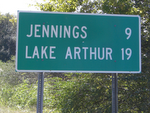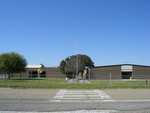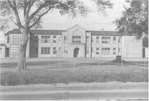China, in its original location, was a postal stop just west/northwest of Elton on a trail running from Jennings to Raymond through China. It was named when a postal inspector misunderstood the British-speaking postmaster, William Jackson, who called the place “cheneau,” meaning “young oaks.” Its origins date back to 1881.
The post office was closed in 1906 when the railroad bypassed China in favor of Elton. In 1910, a post office was again running out of a general merhandise store (1910-1949) located four miles south of Elton on the road from Raymond to Elton. Several years later it was moved again about six miles south of Elton on the road from Raymond to Elton. The store was opened by W.H. Tupper to serve the the many working for him as well as others passing across the countryside. Mr. Tupper was a prominent farmer of China for the first half of the 20th Century. His descendents still farm the same land.
In the September 1931, The Rice Journal published an article entitled
Are Big Factors on Tupper Rice Plantation
Near Elton, Louisiana
Honor of Being One of the "Master Farmers" of Louisiana.
The Tupper rice plantation, five miles south of Elton, is an interesting and an everyday demonstration of successful diversified farming. Instead, however, of diversifying exclusively by raising truck crops and vegetables, the Tupper family raises poultry and livestock and puts up sufficient home grown feedstuff each year to operate a model farm dairy, to fatten meat for all farm needs and to keep the workstock in excellent condition during winter and work seasons of the year.
Mr. W.H. Tupper, owner of the Tupper plantation and one of the many successful rice growers of Louisiana, has the distinction of being a "Master Farmer." To those who know the requirements and rules governing the selection of master farmers in the several states fostering agriculture, the statement that Mr. Tupper was so designated in December, 1930, is sufficient to give them a general idea of what he has accomplished and what he is doing year after year on his rice farm but doubtless there are many to whom such a statement is not adequate for creating a desire to emulate the good example he has set among rice farmers.
In the Tupper home there are five other farmers — Mrs. Tupper, two sons, John Tupper and Charles Tupper, and two daughters, Misses Agnes Tupper and Celia Tupper. They have never been designated officially as "masters," but they nevertheless, have helped Mr. Tupper wonderfully to achieve his distinction and any story of the Tupper farm which does not give them proper credit for what has been done would be very incomplete.Pastures and OrchardsThe Tupper farm, as a rice plantation is not large. It contains 1,400 acres of which much is devoted to pasturage purposes, woods, land, and orchards. Everybody works and everybody is happy. There are no mortgages, no debts of any kind and every season of the year some form of money crop is marketed to add to the total annual income of the family. Mrs. Tupper has charge of the general store which serves the home, the tenant families on the plantation and many neighbor families in the immediate and surrounding communities. The two daughters manage the household affairs and dairy operations. They market the vegetable, fruit and truck crops and raise the hogs and poultry. The sons keep up the machinery of the farm and raise the crops of rice, cotton, and corn. They harvest and store the farm feedstuffs.
Among the outbuildings around the Tupper home there are blacksmith and machine shops, store building and cottages for field hands, power and light plant building, wagons, scales for weighing livestock, stock shed, 160 feet in length, with feed racks and dipping vat; dairy barn, 32 by 50 feet, erected from plans prepared by the Louisiana Extension Department and poultry house and two garages.
All buildings have electric lights and running water and are kept in good condition by timely repairs and new coats of paint when needed. Rice crops are irrigated with water from a well which Mr. Tupper, himself, put down many years ago.
On the farm are many fine fruit trees. From the orchard each year an abundance of pears, figs, peaches, plums and oranges supply seasonal needs and fruit for canning purposes.
Flocks of poultry include ducks, geese, chicken, guinea, and turkeys. These all do well in the barn yards, pastures and rice fields and are the source of a large income on the farm.Livestock AppreciatedThe Tupper rice plantation differs from many rice farms chiefly in the appreciation and use of livestock for dairy purposes, for keeping up the productiveness of the soil and for farming operations. It differs also from many other farms in the use that is made of low grade rice for feedstuff. The 150 head of purebred cattle of which 25 are dairy cows, not only produce a profitable calf crop annually, it supplies milk and butter for the farm and for sale in local markets. Large silos are filled each year. The low grade rices are ground with whole ear-corn and mixed with molasses for a grain feed.
Rejected lots of rice thus ground, supply dairy cows and livestock with all the rice bran, rice polish, and broken rice food contents of rice by-products at a minimum of cost. It is ground at home and can be fed when fresh and very palatable.
Mr. and Mrs. Tupper have two married sons, Jos. L. Tupper and George Tupper. Joseph owns a farm adjoining the lands of his father. George cultivates a part of the Tupper plantation. The two daughters are graduates of business colleges. Miss Agnes, the elder, keeps the books of the store and for the plantation. Mr. Tupper was recently appointed police juror (county commissioner) by Governor Long, for the Elton ward (district). He was born in Seboygan County, Wisconsin in 1869. Mrs. Tupper was born in Knox County, Missouri in 1879. They came to Louisiana shortly after their marriage and rented a part of the land which they now own. The large pine trees shown in the view of their home, were set out by them shortly after they began to build their home place.
The general store's contents was discovered nearly 50 years after it closed. Now, those contents are on display in The W.H. Tupper General Store Museum at 311 North Main Street, Jennings, Louisiana. (visit http://www.tuppermuseum.com/ for more information).
A map indicating postal locations, puts a post office named "Killinger" about a mile east, northeast of the final location of China. The post office was located in a general store that specialized in staple products like flour and cornmeal, which were ground on-site. John Reeves remembers going there as a boy with his mother and everytime they approached the store, there was Mrs. Killinger sitting on the front porch in her rocking chair. He also remembers they served lemonade in a black kettle with a spout that kept cool in the steel.





1 comment:
Kenneth Ardoin, I have heard my Mom and Dad at one time or another speak a bought Killingers' Store when I was a small boy. My Grand father's name was Pheloze Ardoin, born in 1892 and Grandmother was Camilla Gary Ardoin born around 1898. Father was Louis Kenney Ardoin born 1910 and Mother was Hilda Marie LeJeune Ardoin, born 1918. I don't have any other information on the Killinger store.
Post a Comment